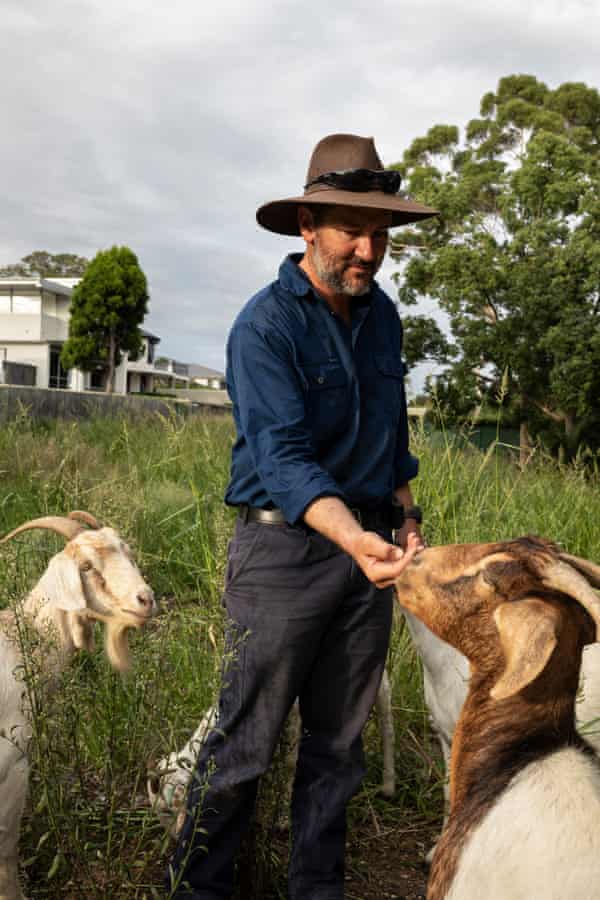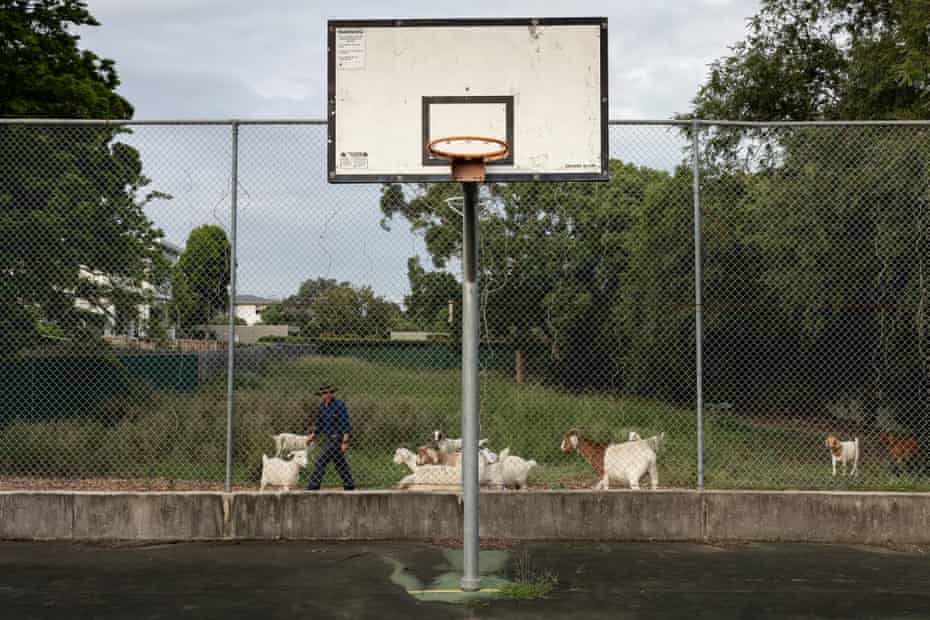La Nina has been good to the backyards and farmlands of much of eastern Australia. Cooler, wetter conditions have led to a flourishing of lush grass, trees and – unfortunately – weeds.
With so many more people working from home, the joy of gazing out of the home office window has turned to dread as the eye alights on knee-high greenery, terrifying tangles of blackberry, pink heads of scotch thistle, and possibly the occasional triffid.
Lawnmowers are noisy and polluting, scythes are so last century, and whipper-snippers can give up the ghost within seconds. What they need is an unstoppable eating machine that will relish the dietary challenge, requires no fuel, and needs only to be left to do its job.
Across Australia, and around the world, mobs of voracious goats are being unleashed – in a carefully controlled fashion – on unwanted flora, and their appeal lies not just in their sustainability.

“It’s a lot nicer watching a goat eat something than watching a lawn mower or a brushcutter,” says Michael Blewitt, owner of Dry Creek Farm, based in Mudgee, which rents out mobs of goats to help landowners get on top of their weed problems.
He would know. After buying a farm a few years ago, Blewitt discovered he and his partner were the accidental owners of around 13 hectares of blackberry, which is such an environmental nasty it’s labelled a weed of national significance. But with a vulnerable newborn in their midst, they were reluctant to use herbicide to bring the thorny weed to heel, and instead looked to permaculture for their solution.
“One of the mantras of permaculture is ‘the problem is the solution’,” he says. “So you’ve got a problem with blackberry, you just need to have something that eats it.” It’s a solution that requires no fuel – apart from that used to transport them – and generates only biodegradable waste. “You get them in, graze through an area, you’ve cycled the nutrients and that improves your soil.”
Goats have a well-deserved reputation for eating anything and everything, from grass to laundry. The secret is their livers and lips, says goat veterinarian Dr Sandra Baxendell, from Goat Vet Oz.
“Their livers have evolved to cope with the tannins that are in browse [foraged food], whereas the livers of sheep and cattle are not as well developed,” Baxendell says.
Goats will eat a huge range of weeds, including blackberry, thistles, scotch broom, honeysuckle and wisteria. They’re aided by their prehensile lips, which enable them to negotiate their way around thorns and prickles to reach the tasty greenery. A mob of around a dozen goats can get through a blackberry patch the size of a single-car garage in around a day.
The idea of renting out goats for weed control came to Blewitt after they acquired 14 goats for their own blackberry-ridden block, and realised how good the animals were at dealing with weeds. Now they have around 70 goats, and – thanks to an amorous billy goat who got frisky and escaped to find the ladies – are about to expand their mob.
Blewitt takes around 15 goats out at a time. There’s a sweet spot between too many eaters and not enough eaters.
“There’s got to be enough food competition to make them eat quickly,” he says, likening the goats to children facing a smorgasbord. “If you have two kids at a smorgasbord, they’ll take their time because there’s heaps of food, but if you put 10 kids, they’ll try to get to the food first.”
A portable electric fence corrals the animals where the food is, and they get to work. The mobs are usually left for period of time – a week or two, but sometimes longer – and as long as they have a little bit of shelter, they’re content. “There’s usually enough tree and vegetation cover and so the goats just stay out and have a snooze out in the open,” Blewitt says.
Blewitt’s clients are a mix of treechangers and farmers. Since Covid-19 struck – and rainfall improved with La Nina – he’s been busier than ever.
“Obviously, there was an increase in growth because of the better conditions,” he says. But the pandemic has seen more people working from home, and reevaluating their location. Many bought blocks of land, then realised how much work it would take to manage them. “They moved into hobby farms, and basically reached out to us and said, ‘can you help us?’.”

In Melbourne, Colin Arnold at GrazeAway has seen a similar boom in demand during the pandemic, although his clients are more local councils and businesses such as Metro Trains.
Arnold launched his business around 15 years ago, after being asked to come up with a way to manage weeds on a 120-hectare property.
“I just remember standing there thinking, ‘I need goats’,” he says. “I knew nothing about goats, never seen a goat, didn’t really know what a goat looked like other than photos. But we investigated it, we got them in and they were fantastic.”
It took some time to convince others of the merits of goats. He would pitch to local governments about having a non-chemical way to manage their blackberry. “I had them on the edge of their seat until I said ‘goats’,” he recalls.
But now business is booming, particularly as the popularity of herbicides such as Roundup wanes. Arnold’s goats are Boer goats. While all goat varieties are equal in terms of their gastronomic agility, he prefers to avoid long-haired varieties such as angora goats, which can get stuck in big blackberry patches.
His goats come in all sizes: the smaller, younger goats are used for habitat restoration where they will eat weeds but not the native plants, while the bigger, hungrier goats are saved for the bigger tasks. “There’s a lot of trees that are weeds … and big goats destroy those,” he says. His goats are even helping to control weeds in public parks and on school grounds. “There’s no chemicals, no noise, and all the kids love it.”